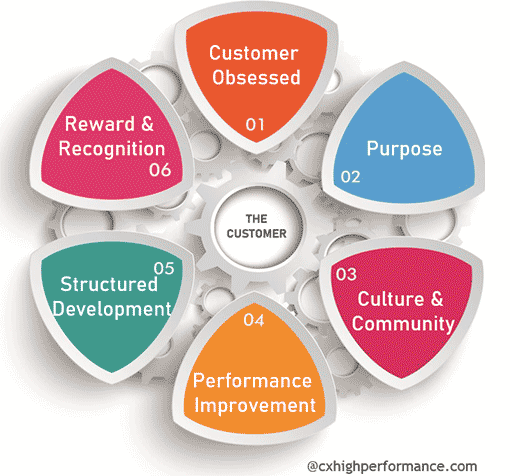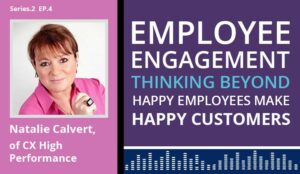We share ten top tips for improving employee engagement, which have been shared with us by contact centre experts.
The first five tips for employee engagement from our industry experts are shared in the video above.
If you would prefer to simply scan the tips, they are also written out below.
1. Review Your Leadership Style
When you are the leader, there are two key things that you need to think about in terms of employee engagement.
- Who you are as a person?
- What do you do?
Stop for a moment and consider these two questions closely.
In regard to the first question, you can dissect it further by thinking about:
- How clear are you?
- How predictable are you?
- How emotionally stable are you?
- Can people understand your key principles?
Then, look at the second question and consider:

Daniel Ord
- Do you delegate?
- Do you tap people’s individual talents?
- Do you pull people together and ask for their opinion?
Just through thinking about who you are and what you do you can build lots of great ideas for how you can build employee engagement in your unique contact centre setting.
You need to look in the mirror first before you start looking at everybody else.
Contributed by: Daniel Ord at OmniTouch International
For more advice on developing your leadership skills, read our article: Team Leadership: What Makes a Great Leader?
2. Understand the Six Dimensions of Engagement
There are six dimensions to my employee engagement model. These are laid out in the diagram below.

If we can get these six elements really being delivered, across our business, that can be very powerful.
But let’s first understand that employee engagement starts with a great idea and is then followed on with science.

Natalie Calvert
We should be looking at the impact of our employee engagement initiatives on our business numbers, employees and customers.
Don’t think about employee engagement through the lens of making people feel happy, making them feel good or just to have some fun in the office. There should be a really clear business purpose behind employee engagement.
Contributed by: Natalie Calvert at CX High Performance
To find out more from Natalie on this topic, read our article: How to Measure Employee Engagement
3. Differentiate Between Engagement and Satisfaction
When it comes to the topic of employee engagement, the very first thing that we have to do is differentiate between engagement and satisfaction.
Employee satisfaction revolves around things like:
- Do I feel like I am paid fairly?
- Are the hours that I work acceptable?
- Are my benefits relevant to me and my situation?
These questions can be turned into measures of satisfaction and they cover things that advisors can likely get elsewhere.
What employees can’t get just anywhere else is the feeling that they are greater than just themselves. That the work they are doing right now is setting them on a path to future success. Whether that’s:

Justin Robbins
- In the contact centre
- In the company
- Or somewhere beyond that
Having that purpose is the essence of employee engagement.
When we get advisors into this kind of long-lasting mentality, we’ll find that the engagement within our organization is beyond what we could have ever imagined.
Contributed by: Justin Robbins at CX Effect
4. Ask, Listen and Act

Katie Stabler
Ask for employee feedback, listen to everything and, most importantly, act on it.
Also, ensure that your employees see real customer feedback, ideally in real time and related to their specific interactions.
Finally, make sure that you empower employees to act with confidence.
Contributed by: Katie Stabler at CULTIVATE Customer Experience by Design
5. Encourage Team-Based Improvement
Below are four ways to focus on team-based improvement, which will serve the greater purpose of improving employee engagement.
- Drive employee engagement by involving the team in the changes that affect them
- Have them identify and work in teams on external/internal customer improvements
- Ensure teams are coordinated, joined up and supported
- Establish a reputation as a leading employer in the marketplace

John Aves
We have a big job, as managers, to make sure we implement each of these steps effectively.
If we don’t, things can happen, like, for example, two groups within the contact centre end up working on the same thing and neither are given the support to make as big a positive difference as they possibly could.
Contributed by: John Aves at cp2experience
For more from John on improving contact centre engagement, read our article: How to Improve Agent Engagement
Our Second Employee Engagement Video
We now have a second set of tips for increasing employee engagement, which is ready to be shared with you.
These are once again written out below, for all those wanting to further dissect each tip.
6. Close the Feedback Loop
Take a moment and consider: do you actually act on the employee feedback that you gather?
So, lots of money is spent on employee engagement and gaining insights into employee experience, but acting on those insights is a critical step where many organizations fail.

Rob Clarke
Part of the reason for that is because organizational culture forms a big part of employee engagement. Yet trying to tackle that can feel like trying to boil the ocean.
Instead, if you try to look at team climate – on a team-to-team basis – that’s a far easier thing to change. And, don’t forget, that corporate culture comes from the sum of all team climates.
Contributed by: Rob Clarke at Elev-8 Performance
7. Empower, Recognize and Reward
Empowering advisors is all about giving your people the power to think for themselves. Nobody wants to be given a call script and be told: “This is your lane, don’t deviate from the plan.”
So, give advisors the right general policy, give them the right tools, hire smart people and then let them at it – providing lots of support systems for them to fall back on.
Recognition starts with saying “thank you” publicly, in front of their colleagues and other people in the business. This will show advisors that their efforts are valued.
Other recognition ideas includes highlighting social shout-outs, celebrating milestones and recognizing achievements in quality or customer satisfaction scores.

Dan Moross
Rewards don’t have to be monetary or merchandise of any kind. Of course, giving prizes to advisors who perform well is great, but also try to fund social activities – which can include virtual events.
This three-point system of empower, recognize and reward is how we engage our contact centre team at MOO.
Contributed by: Dan Moross at MOO
For more from Dan on how MOO create a culture of happy and engaged employees, check out the following episode of The Contact Centre Podcast.
The Contact Centre Podcast – Episode 2:
How Can You Create A Happy Culture Of Positive People?
For more information on this podcast visit Podcast: How can you create a happy culture of positive people?
8. Create an Employee Forum
Who wants to just be another number within a business, with no voice, no name and no involvement? No one.
This is no different when it comes to your contact centre advisors. If anything, they should be heard the most.
Advisors are your frontline team, your first responders, the team that can tell the people behind them – i.e. management – what they can expect being “up-front”.
With that, your advisors just want to be heard. So build a forum in which they can present ideas and raise concerns without repercussions.

Jason Griffin
This last point is crucial, as the mindset of an advisor is that if they raise areas of concern or improvement, there will be repercussions for them – whether direct or indirect. That is one of the biggest things that advisors think of.
You have to try and remove that as much as possible and, if you do, you’ll find out exactly what is happening inside your contact centre.
Contributed by: Jason Griffin at Five9
9. Track an Employee Net Promoter Score
I’m always heartened when a contact centre tells me that they conduct an employee satisfaction survey.
Yet I become slightly jaded when I find out that they only do so once every year and that advisors complete the same survey as everyone else within the organization.

Nerys Corfield
It is much better to make a more concerted effort on a regular basis, i.e. a least quarterly, to find out just how engaged your advisors are by conducting an employee net promoter score (ENPS) survey.
This will enable you to closely monitor how engaged your team – your most vital contact centre resource – are, while also enabling you to measure the impact of other initiatives on contact centre engagement levels.
Contributed by: Nerys Corfield at Injection Consulting
Find out how you can track ENPS in your contact centre by reading our article: How to Calculate an Employee Net Promoter Score
10. Give Your Team a Voice
The key to employee engagement is in giving your employees a voice.
People, particularly in contact centres, can often feel as though they have very little interaction with senior management and they certainly don’t feel like they are heard.

Sarah Morgan
So do what you can to give your contact centre team a voice and then really listen to what they have to say.
Not everything can be implemented. You can’t change everything that an advisor might come up with, but giving advisors the opportunity to share their ideas and answering their questions is critical.
Contributed by: Sarah Morgan at Luceat Coaching
To find lots more advice for boosting contact centre engagement, read our articles:
- Staff Engagement: How to Motivate Employees – With a Checklist
- 11 Team Engagement Ideas to Inspire Your Remote Workers
- Podcast – Employee Engagement: Thinking Beyond Happy Employees Make Happy Customers
Author: Rachael Trickey
Reviewed by: Jo Robinson
Published On: 17th Mar 2021 - Last modified: 28th Mar 2025
Read more about - Video, Dan Moross, Daniel Ord, Editor's Picks, Employee Engagement, Five9, John Aves, Justin Robbins, Katie Stabler, Natalie Calvert, Nerys Corfield, Rob Clarke, Sarah Morgan, Team Management, Videos
















